
English_books / MacMillan-FCE.Language.Practice.With.Key(M.Vince) nen in
.pdf
GRAMMAR 17 MODAL VERBS: PAST
5 Choose the most suitable description for each picture.
a)
1)You must have read the notice.
2)You should have read the notice.
1)We can't have worn our raincoats.
2)We needn't have worn our raincoats.
1)He must have hit him in the right spot!
2)He should have hit him in the right spot!
1)You must have caused an accident!
2)You might have caused an accident!
1)Sorry, I had to go to the dentist's.
2)Sorry, I should have gone to the dentist's.
1)You shouldn't have stroked the lion!
2) You didn't have to stroke the lion!
103
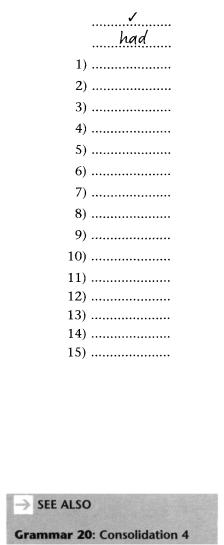
FIRST CERTIFICATE LANGUAGE PRACTICE
6Look carefully at each line. Some of the lines are correct, and some have a word which should not be there. Tick each correct line. If a line has a word which should not be there, write the word in the space.
Zoo escape shocks residents
Residents in the Blackwood area complained last night that they should have had been warned about the escape of a dangerous snake. The snake, a python is three metres long, and can to kill pets. 'I heard
about it on the radio,' said Mrs Agnes Bird. 'I had gone to lock my dog in the kitchen this morning, because
I thought the snake could easily have attack it. Now
I am not sure what I ought to be do.' The snake, called Lulu, disappeared from the Blackwood Zoo. 'It must be have found a hole in the wall, or it might have been slipped out while the door was open,' said zoo director Basil Hart. Mr Hart said that people didn't needn't have been alarmed. 'A local radio station must have had mixed up its reports,' he went on. 'We found Lulu a few minutes after we missed her. We have had to climb a tree and bring her down. So you see, you should have never believe silly stories you hear on the radio!
Key point
In speech, have is often contracted with modals used in the past.
You shouldn't've done it.
104

Explanations
•What are functions?
We can describe language by using words to talk about grammar (grammatical description). But we can also describe language by saying how it is used. This is the function of the language (functional description).
If I were you, I'd leave now. grammatical description: second conditional
functional description: giving advice
•Choosing what to say
Our choice of words can be influenced by the situation we are in, by the person we are talking to, and by what we are talking about. Compare these different phrases for asking permission.
Asking permission from a friend:
Is it all right if I use the phone?
Asking permission from the same person, but about a more serious topic:
Do you think I could possibly phone Australia?
Asking permission from a stranger:
Do you mind if I open the window?
The first example was informal and friendly. The second two examples were more formal and polite. There are no exact rules about when to use an informal phrase and when to use a polite phrase, but usually we use polite language when we:
•talk to strangers or people we don't know well.
•talk to people who have higher status.
•talk about sensitive topics.
•This unit practises the following functions and possible responses.
Asking for and giving advice
Agreeing and disagreeing
Apologising
Complaining
Ending a conversation
Asking for and giving directions
Greeting
Asking how someone is
Asking for information
Introducing yourself and others
Inviting
Accepting and declining invitations
Offering something
Offering to do something
105
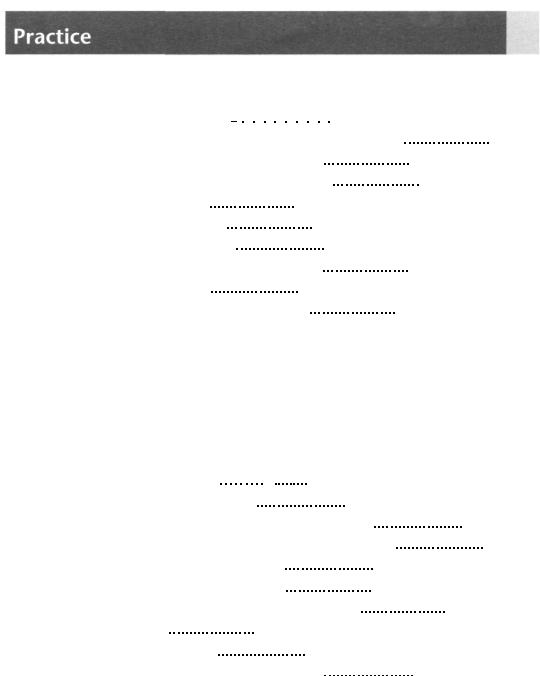
FIRST CERTIFICATE LANGUAGE PRACTICE
Match each sentence (a-j) with a function from 1-10.
a)That's very kind of you, I'd love to 4
b)Well, it's been nice talking to you, but I'm afraid I have to go
c)Could you tell me how to get to the post office?
d)You might have told me you were having a party!
e)Shall I carry this bag for you?
f)What do you think I should do?
g)Actually, I don't think that's right
h)Would you like to come round for a drink later?
i)Jack, this is my brother, Mark
j)Could you tell me what time the bank opens?
1 |
Complaining |
6 |
Asking for directions |
2 |
Inviting |
7 |
Introducing other people |
3 |
Asking for information |
8 |
Offering to do something |
4 |
Accepting an invitation |
9 |
Disagreeing |
5 |
Asking for advice |
10 |
Ending a conversation |
2 Match each sentence (a-j) with a function from 1-10.
a) Would you like some more tea? |
.6. |
b)I think you'd better phone the police
c)I'd love to come, but I'm already going out that evening
d)Good morning, I'm Brenda Watson, the Marketing Manager
e)I'm sorry I'm late - it won't happen again
f)Would you like me to do the washing-up?
g)Excuse me, but is the bus station anywhere near here?
h)Hi, Sally, how are you?
i)I think that's the point exactly
j)It's at the end of this street, opposite the church
1 |
Declining an invitation |
6 |
Offering something |
2 |
Introducing yourself |
7 |
Agreeing |
3 |
Greeting a friend |
8 |
Apologising |
4 |
Offering to do something |
9 |
Giving directions |
5 |
Asking for directions |
10 |
Giving advice |
106

G R A M M A R 18 F U N C T I O N S 1
3Choose the most suitable response.
a)Do you feel like going to the cinema this evening?
1)That would be great.
2)Thank you very much for your kind invitation.
b)More coffee anybody?
1)Would it be all right if I had some more?
2)I'd love some.
c)I wish you wouldn't smoke in here!
1)I don't agree, I'm afraid.
2)Sorry, shall I open the window?
d)Well, it was nice talking to you, but I have to dash.
1)Yes, I enjoyed talking to you too.
2)OK, see you.
e)Could you tell me whether this train stops at Hatfield?
1)I believe I could.
2)I believe it does.
f)Shall I collect the tickets for you?
1)That would be a real help.
2)Yes, I think you shall.
g)What would you do in my situation?
1)I think you should ask for a loan from the bank.
2)I thought you would ask for a loan from the bank.
h)How do you do. I'm Bill Thompson.
1)Very well thank you.
2)How do you do.
107
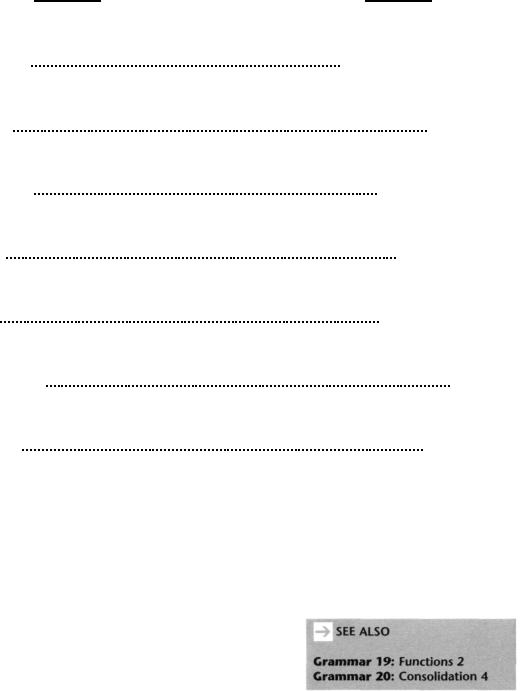
FIRST CERTIFICATE LANGUAGE PRACTICE
4Complete the second sentence so that it has a similar meaning to the first sentence, using the word given. Do not change the word given. You must use between two and five words, including the word given.
a)Can I offer you a lift home?
|
|
|
like |
|
|
|
|
|
|
|
|
Would |
you |
like |
a |
lift |
home? |
|
|
b) |
What time does the next train leave? |
|
|
|
||
|
|
|
tell |
|
|
|
|
|
|
|
|
Could |
|
|
|
the next train leaves? |
|
|
|
c) |
I think you should sell the car. |
|
|
|
|
|
|
|
|
I'd |
|
|
|
|
|
|
|
|
If I |
|
|
|
|
the car. |
|
|
d) |
Shall I mow the lawn? |
|
|
|
|
|
|
|
|
to |
|
|
|
|
|
|
|
|
Would |
|
|
|
|
mow the lawn? |
|
|
e) |
Am I going the right way for Downwood? |
|
|
|
||
|
|
|
this |
|
|
|
|
|
|
|
|
Is |
|
|
|
|
Downwood? |
|
|
f) |
Do you have to make so much noise! |
|
|
|
||
|
|
|
wouldn't |
|
|
|
|
|
|
|
|
I |
|
|
|
|
so much noise! |
|
|
g) |
What's your advice? |
|
|
|
|
|
|
|
|
should |
|
|
|
|
|
|
|
|
What do |
|
|
|
|
do? |
|
|
h) |
Let's go for a pizza. |
|
|
|
|
|
|
|
|
going |
|
|
|
|
|
|
|
|
How |
|
|
|
|
a pizza? |
Key p o i n t s |
1 |
Our choice of words depends on the situation, our relationship with the person |
||||||
|
|
we are talking to, and what we are talking about. |
|
|
|
|||
2We should respond in an appropriate way, informally or politely (see point 1) and in accordance with how the other person speaks to us first.
3If we do not use polite forms, there is a risk that the other person will think we are being rude. We may not get the result from the conversation that we want.

Explanations
This unit practises the following functions and possible responses.
Things to say on special occasions or at special moments Asking for and giving an opinion
Pausing to think
Asking for permission
Giving and refusing permission
Expressing preferences
Promising
Reassuring
Recommending
Refusing to do something
Making and responding to a request
Suggesting
Thanking
109
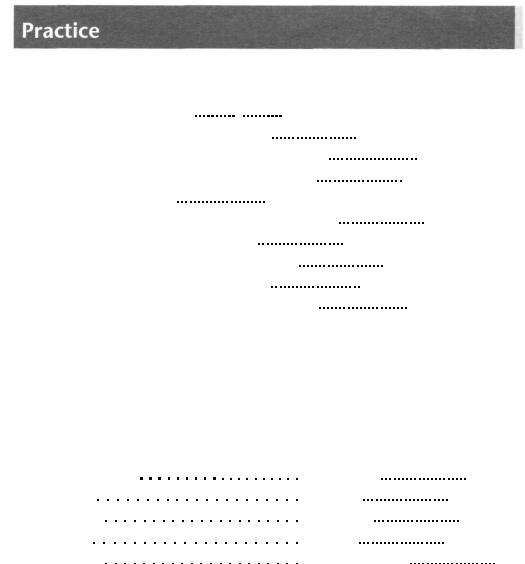
FIRST CERTIFICATE LANGUAGE PRACTICE
Match each sentence (a-j) with a function from 1-10.
a) Wait a minute, let me see |
5. |
b)What did you think of the film, then?
c)I'll definitely bring your camera back tomorrow
d)Would it be all right if I left a bit early today?
e)Sorry, no, I won't do it
f)Could you possibly turn on the air conditioning?
g)I think I'd rather have fish, actually.
h)Why don't we have a party next weekend?
i)That's very kind of you, I appreciate it
j)Don't worry, everything will turn out all right
1 |
Promising |
6 Making a request |
|
2 |
Refusing |
7 |
Thanking |
3 |
Suggesting |
8 |
Asking for an opinion |
4 |
Expressing a preference |
9 |
Reassuring |
5 |
Pausing to think |
10 |
Asking permission |
2 Match each sentence (a-j) with a function from 1-10.
a) |
Congratulations! |
4 |
f) |
Excuse me! |
b) |
Look out! |
|
g) |
Pardon? |
c) |
Oh bother! |
|
h) Bless you! |
|
d) Whoops! |
|
i) |
Cheers! |
|
e) |
Well done! |
|
j) |
You poor thing! |
1 Praising someone's performance
2Expressing annoyance
3Wishing someone good health when drinking
4Expressing happiness at someone's success
5Attracting attention or asking someone to move out of your way
6Expressing sympathy
7 Expressing that something has/has nearly gone wrong
8Giving a warning
9Showing that you have misheard or misunderstood
10Said when another person sneezes
110

G R A M M A R 1 9 F U N C T I O N S 2
3 Choose the most suitable response.
a)What do you think of my new car?
1)It's all right I suppose.
2)I think a lot.
b)Do you promise to pay me back at the end of the month?
1)I'll pay.
2)I promise.
c)Can I use your phone?
1)You may not.
2)Of course.
d)Where do you suggest I stay?
1)I recommend the Hilton.
2)Let's stay at the Hilton.
e)Do you want beer or wine?
1)I'd prefer beer, please.
2)I'd rather beer, please.
f)I can't stop worrying about my exam tomorrow.
1)That's all right, never mind.
2)I'm sure you'll do well.
g)Janet, make us some tea, will you?
1)No I won't, I'm afraid.
2)I can't, I'm afraid.
h)Would you mind moving your bag from the seat?
1)Oh, sorry.
2)No, I wouldn't.
i)How kind, you really shouldn't have bothered.
1)It was nothing, really.
2)Don't worry, I didn't bother.
j)Is it all right if I use your bike?
1)Please accept it with my best wishes.
2)Sure, go ahead.
I l l
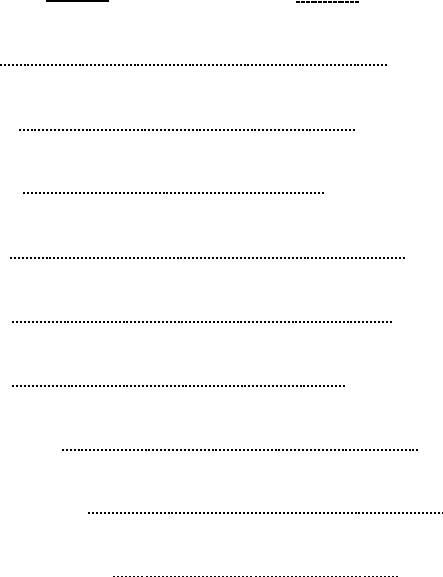
FIRST CERTIFICATE LANGUAGE PRACTICE
4Complete the second sentence so that it has a similar meaning to the first sentence, using the word given. Do not change the word given. You must use between two and five words, including the word given.
a)What's your opinion of Roger's new book? think
What do |
you |
think |
of |
Roger's new book? |
b)Thank you very much for your help. am
I |
for your help. |
c)May I leave my bag here? if
Is it |
leave my bag here? |
d)Let's go to the beach tomorrow. we
Why |
to the beach tomorrow? |
e)I like going sailing more than swimming. rather
I'd |
swimming. |
f)Could you open a window? think
Do |
the window? |
g)Is it all right if you take care of the children? mind
Do |
care of the children? |
h) I recommend going by train. |
|
go |
|
I think you |
by train. |
i) Excuse me, I can't get past you! |
|
in |
|
Excuse me, you |
way. |
j) 'You've passed your driving test, Ron! Well done!' said Carol. |
|
on |
|
Carol congratulated |
driving test. |
112
